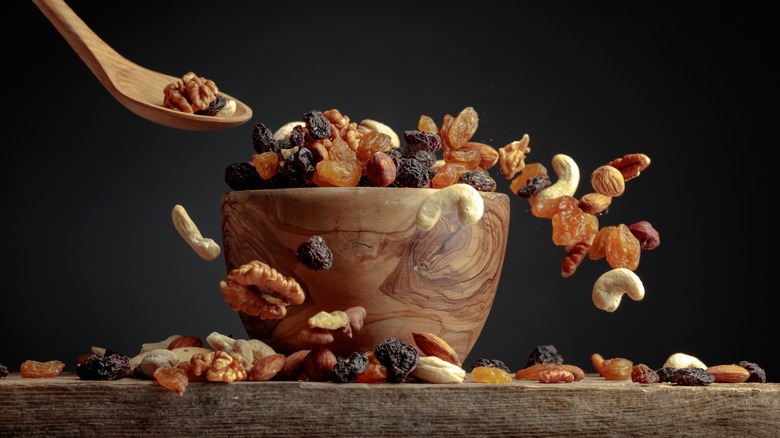Is Dried Fruit Actually Good For You?
Fruit is generally one of the safer and healthier foods we can consume — which is probably why the saying, "An apple a day keeps the doctor away" got popular. When you think of fruits, your mind may go to fresh oranges or watermelons. But what about dried fruit? The kind you find packaged and sold at supermarkets, added to nuts, or found in trail mixes?
Are freeze-dried or dehydrated dates, apricots, prunes, raisins, figs, and peaches good for you? Since dried fruits are waterless, their nutrients are technically more concentrated than fresh fruits (so think more vitamins and minerals than regular fruit). However, this doesn't necessarily mean that they're all healthy. In fact, if you compare dried fruit versus regular fruit, the sugar content in dried fruit is a lot more concentrated as well. Yes, dried fruit can be a good source of fiber, antioxidants, iron, potassium, calcium, and other minerals and vitamins. But their high fructose content makes them a concerning snack, especially for those with diabetes.
As shared by gut health expert, Dr. Partha Nandi (via WXYZ Channel 7), "The natural sugar in dried fruit is much more concentrated. If you eat a cup of grapes, you'll get 23 grams of sugar and 104 calories, but if you eat a cup of raisins [dried grapes], you're now consuming 116 grams of sugar and 520 calories. So huge difference."
This doesn't mean dried fruit isn't healthy
Eating dried fruit can lead to better overall health, but the quantity and quality of the product need to be kept in mind. Dried fruit, in theory, are a shrunken and highly concentrated version of all that's good about regular fruit — antioxidants, vitamins, minerals, etc. In fact, according to registered dietitian and nutritionist Keri Gans, per Well+Good, "the anti-inflammatory properties from the antioxidants [found in dried fruit] may help decrease the risk for heart disease and certain cancers, and they boost immunity." As a rich source of fiber, dried fruit can also aid digestive health. Prunes are known to be natural laxatives while raisins have a low to medium glycemic index — which means they won't typically cause big spikes in blood sugar levels, according to Healthline.
What you should be concerned about is how easy it is to over-eat dried fruit (because of their size and packaging) and any added sugars or preservatives that might be in them. For those with diabetes, this becomes even more significant. New Jersey-based dietitian Erin Palinski-Wade (via Eating Well) says, "Portion size, fiber content, and what the food is eaten in combination with all impact the extent the blood sugar will rise after consumption."
What's the best way to consume dried fruit?
Since you may not register how much raisins you're popping into your mouth (and you might not feel as full as you would after a bowl of grapes), it's important to practice mindful eating. Registered dietitian nutritionist and author, Whitney English Tabaie shared with Well+Good, "Practice mindful eating when consuming dried fruit by plating your snack versus eating straight from the bag, and paying attention to your meal so your brain registers fullness."
The next tip would be to look for dried fruit that's higher in fiber content, especially for those concerned about blood sugar levels. Examples include apricots, dates, figs, and prunes, per Eating Well. It's also good to combine your dried fruit intake with healthful foods like nuts, salads, plain yogurt, and even some curries. Keep in mind just how concentrated the snack can be — don't confuse it with having regular fruit daily. "The U.S. dietary guidelines recommend that we eat 1 1/2 to 2 cups of fresh fruit daily. Roughly a half cup of dried fruit equals one cup of fresh fruit," shared Nandi (via WXYZ Channel 7)
Finally, read the labels of your products before purchasing them and check for any added sugars or preservatives like sulfur dioxide. Sulfur dioxide can "cause stomach cramps and asthma attacks in people who have sensitivities to sulfites," according to Nandi. Ideally, look for dried fruit without any added sugars. This may mean hunting for the organic kind.



